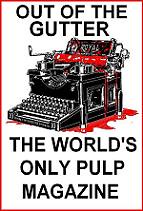
Sandra Seamans posted the link to this article, by Bev Vincent called "Apparently I write Like a Girl" (Bev is not a girl, inspite of how he might write.)
Great article. Biases fascinate me. The idea that a certain gender writer can or cannot write a certain gender character convincingly is such a curious concept. To me, it's not the gender, but the writing.
I've read books with female characters that didn't strike me as being very real. I chalked it up to stereotypes and lack of character development. Not author gender. Having balls or boobs does not make one able to write convincing characters of the same gender. A male writer can buy into all the stereotypes of how men area supposed to act just as they could of how women are supposed to act. Neither set of stereotypes works terribly well in fiction or in real life, IMNHO. And I know far too many people of both gender who act largely according to a particular set of gender stereotypes.
While it's a little surprising (and disappointing) that there are still people who make assumptions based merely on gender, it's even more disappointing that those assumptions become expectations. And it's hard to break free from expectations. Hard for someone who sees sex as primarily physical to write emotion into the act, even if it is expected. Hard to write a "real" female character if one's definition of "real" doesn't include enough of the expected characteristics.
After all, in fiction, the bottom line is this: it doesn't matter if it's true, the reader has to believe it.





3 comments:
Writing a female character is hard to begin with. Depending on the age of the reader, they see females in a whole different light. I remember one story that I wrote, based on a woman I knew, and it was rejected because "no woman would act that way".
Just for example, if the Baby Shark books had been written in the fifties, nobody would have bought the premise. Yet, today, they accept that a woman could fight back and win.
That was an eye-opener, Clair.
I had a male editor go over my first manuscript to make sure I had gotten the male aspects right. He made a few suggestions where I had made mistakes. One can never presume.
If a writer has an ear for it, they can fool anyone. Laura Lippman writes male and African American dialogue that is virtually flawless.
Post a Comment